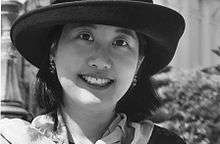Karen An-hwei Lee
| Karen An-hwei Lee | |
|---|---|
 | |
| Born | 1973 |
| Nationality | American |
| Education |
Brown University; University of California, Berkeley |
| Genre | Poetry |
Karen An-hwei Lee (born 1973) is an American poet.
Life
Born in 1973, and raised in Massachusetts, Lee is a Chinese American poet, translator, and critic.[1] She earned an M.F.A. in creative writing from Brown University and a Ph.D. in literature from the University of California, Berkeley. A former resident writing fellow at the MacDowell Colony for the Arts in Peterborough, New Hampshire and the Millay Colony for the Arts in Austerlitz, New York, Lee currently resides in Santa Ana, California.
Her first poetry book, In Medias Res: a primer of experience in approximate alphabetical order, was selected by poet Heather McHugh and published by Sarabande Books in 2004. Lee received six Pushcart Prize nominations, a National Endowment for the Arts Grant,[2] the Poetry Society of America's Norma Farber First Book Award, the Kathryn A. Morton Prize for Poetry from Sarabande Books, and the July Open sponsored by Tupelo Press.[3]
Her poetry and fiction has appeared in Greensboro Review,[4] Prairie Schooner,[5] Columbia Poetry Review,[6] and a number of other publications.[7][8] She is the author of a chapbook, God's One Hundred Promises (Swan Scythe Press, 2002),[9] and a second full-length collection, Ardor (Tupelo Press, 2008).[10] In 2017, Ellipsis Press published her first novella, Sonata in K.[11]
Awards
- 2005 National Endowment for the Arts Literature Grant [2][12]
- 2004 Poetry Society of America's Norma Farber First Book Award.[13]
- 2004 Kathryn A. Morton Prize for Poetry, Sarabande Books[14]
- 2002 Swan Scythe Press Prize[14]
- Eisner Prize, University of California, Berkeley
- Yoshiko Uchida Foundation Fellowship
- Beinecke Foundation Fellowship
- John Hawkes Prize, Brown University
Works
- "Falling Leaves Return to Roots". Spoon River Poetry Review. XXVII (1). Winter–Spring 2003.
- "Meditation on a Cenote". Emprise Review. 8. April–May 2008.
- "Third Letter: Resilience". Swarthmore Review (1). Spring 2008.
Poetry books
- Ardor. Tupelo Press. 2008. ISBN 978-1-932195-69-9. [15]
- In Medias Res. Sarabande Books. 2004. ISBN 978-1-932511-07-9.
- God's One Hundred Promises. Swan Scythe Press. 2002. ISBN 978-1-930454-15-6.
- Women at the Well. Brown University. 1997.
References
- ↑ "Karen An-Hwei Lee". Poetry Foundation. Retrieved 28 January 2014.
- 1 2 "Karen An-Hwei Lee". NEA. Retrieved 28 January 2014.
- ↑ "Karen An-Hwei Lee Profile". Poets & Writers. Retrieved 28 January 2014.
- ↑ "GR Contributors: Fall 2006". www.greensbororeview.org.
- ↑ "Wasp.(Poem)". Prairie Schooner. 22 December 2006.
- ↑ http://english.colum.edu/cpr/arch/no20.htm
- ↑ "Karen An-Hwei Lee Poetry". As Us. Retrieved 28 January 2014.
- ↑ "Table of Contents". The Leopard Seal. Retrieved 9 February 2014.
- ↑ "God's One Hundred Promises". Swan Scythe. Retrieved 28 January 2014.
- ↑ "Ardor by Karen An-Hwei Lee". Tupelo Press. Retrieved 28 January 2014.
- ↑ "Ellipsis Press". www.ellipsispress.com.
- ↑ http://www.arts.endow.gov/features/Writers/writersCMS/index.php?year=2005
- ↑ "Poetry Society of America: Norma Farver Book Award". Poetry Society. Retrieved 11 August 2013.
- 1 2 "Poets & Writers: Karen Lee". Poets & Writers. Retrieved 11 August 2013.
- ↑ EMILY SCHORR LESNICK (December 17, 2008). "ARDOR by KAREN AN-HWEI LEE Reviews". galatea ressurects #11.
As an Asian-American woman poet, Lee is adamant in using her own voice and her own body as subject, while also criticizing systems of power that might place her there against her will. Throughout Ardor, Karen An-Hwei Lee is looking in a mirror, speaking directly to her body. The only way to enter the dialogue is to begin reading.